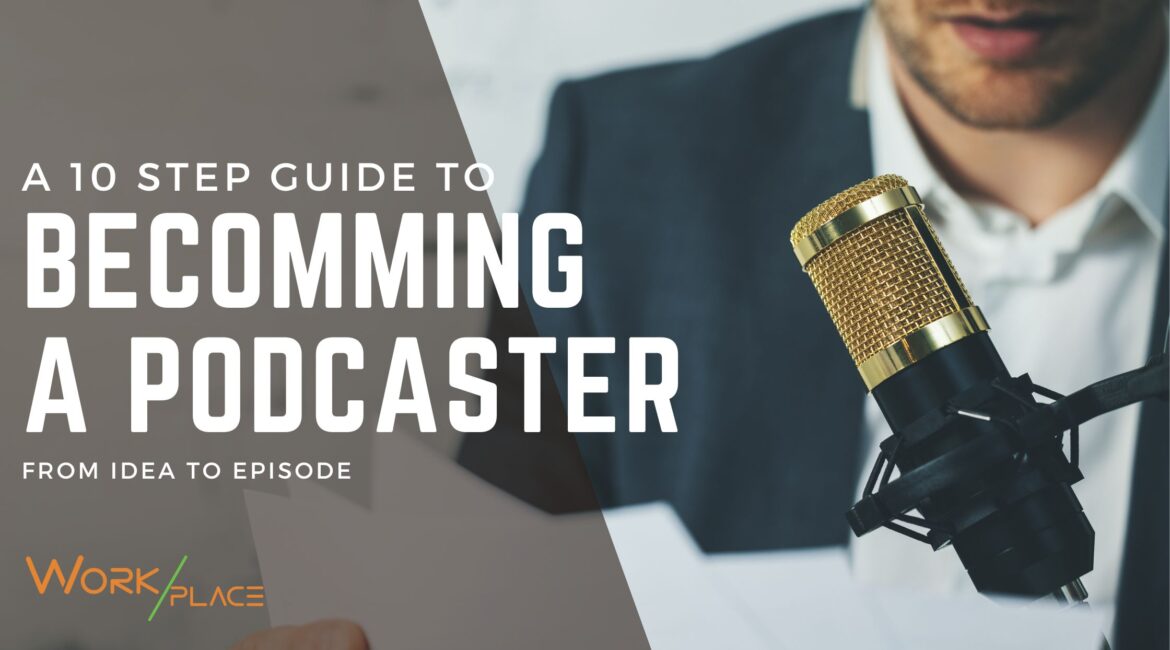In recent years, podcasting has exploded in popularity as a versatile and accessible medium for sharing stories, knowledge, entertainment and becoming a thought leader. If you’ve been itching to join the podcasting world, you’re in the right place. In this comprehensive guide, we’ll take you through the steps to become a podcaster, from conceptualizing your show to releasing your first episode. The best part? You can do it all in our newly opened podcast studios at Work/place! Let’s dive in!
Define Your Niche and Audience
Before you even think about recording, start by defining your podcast’s niche and target audience. Ask yourself what topics you’re passionate about and what you can offer that’s unique or valuable. Narrow down your focus to a specific niche to stand out in the crowded podcasting landscape. Understanding your audience is equally crucial; know their interests, problems, and preferences to create content that resonates.
Plan Your Content
Now that you have your niche and audience, it’s time to plan your content. Create an outline or a content calendar that outlines the topics, episode titles, and release schedule. Consistency is key in podcasting, so decide on a release frequency (e.g., weekly, biweekly) that you can realistically maintain.
Get the Right Equipment
As a member at Work/place, our podcasts rooms are yours to utilize and enjoy! We can show you how to set up the equipment to record your podcast. This is a huge money savings for you because you won’t have to spend your money buying expensive podcast equipment.
Record Your Episodes
With your equipment in place, it’s time to record your episodes. Create a quiet, soundproofed space where you can speak clearly and without interruptions. Write a script or outline to keep your content organized. Practice speaking naturally and confidently. Don’t worry if you stumble over words; you can edit later.
Edit and Enhance Your Audio
Editing is where you can polish your podcast and make it sound professional. Remove background noise, cut out mistakes, and add intro/outro music or sound effects if desired. Popular audio editing software includes Audacity (free), Adobe Audition, and GarageBand. Take your time to perfect each episode.
Design Your Podcast Cover Art and Branding
Your podcast cover art and branding are crucial for attracting listeners. Create eye-catching cover art that represents your show and its content. Consistency is key, so use the same branding elements (colors, fonts, logo) across your website, social media, and promotional materials.
Hosting and Publishing
To make your podcast accessible to the world, you need a podcast hosting platform. Some popular options include Libsyn, Podbean, and Anchor (free). These platforms store your audio files, generate an RSS feed, and distribute your episodes to podcast directories like Apple Podcasts, Spotify, and Google Podcasts.
Promote Your Podcast
Once your podcast is live, it’s time to promote it. Share your episodes on social media, create a website or blog for your podcast, and engage with your audience through email newsletters or social media. Collaboration with other podcasters or influencers in your niche can also help expand your reach.
Engage with Your Audience
Building a loyal audience takes time and effort. Encourage listeners to leave reviews, provide feedback, and subscribe to your podcast. Engage with them on social media and through email. Consider hosting Q&A sessions or listener-driven episodes to foster a sense of community.
Learn and Improve
As you produce more episodes, you’ll likely notice areas where you can improve. Pay attention to listener feedback and use analytics from your hosting platform to track your podcast’s performance. Continue learning about podcasting trends, interviewing techniques, and audio editing to refine your skills.
Conclusion
Becoming a podcaster is an exciting journey that allows you to share your passion and knowledge with the world. It requires dedication, creativity, and a commitment to continuous improvement. Remember that podcasting is not just about creating content; it’s about building a community and connecting with your audience. So, take your time, enjoy the process, and watch your podcast grow and thrive in the ever-expanding world of audio content. Happy podcasting!

